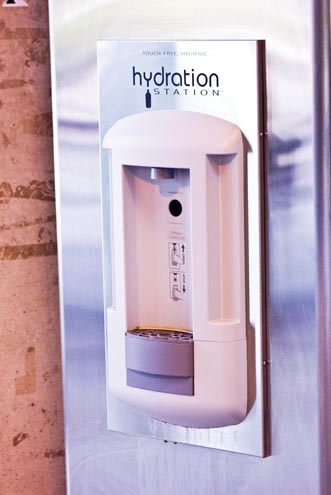 New water stations around campus will make York greener
New water stations around campus will make York greener
Melissa Sundardas
News Editor
The sale of bottled water on York’s campuses is set to dry up by 2015.
This decision was announced by York President and Vice-Chancellor Mamdouh Shoukri last month as part of a much larger effort to reduce York’s ecological footprint.
“The timeframe is crucial as it allows our institution the ability to assess our drinking water infrastructure, improve access, educate the community, and ultimately, reduce the amount of waste that we as an institution generate,” says Shoukri.
There are currently 25 water-refill stations on both of York’s campuses combined that provide both students and faculty members with free access to filtered water. That amount is expected to at least double by 2015, and water stations will be included in all prospective design plans, says Ilan Kapoor, York environmental studies professor and chair of York’s sustainability council.
Kapoor says that the phase-out is part of a larger plan.
“We live in a society where the convenience factor leads to all sorts of unsustainable practices,” says Kapoor. “We need to not think of convenience all the time, and we must start to think of our ecological footprint. The point is we’re not removing access to water; rather, we’re increasing access to free water across campus rather than privatized, paid-for water, and I think all in all, it’s a much better situation.”
Alastair Woods, vice-president of campaigns and advocacy for the York Federation of Students, says the discussion about specifically phasing out bottled water sales came after a YFS campaign. Take Back the Tap, a national initiative run by the Canadian Federation of Students and the Sierra Youth Coalition, focuses on getting whole communities to phase out the sale of bottled water.
Planning involved three years of negotiations with the university and the president’s sustainability council.
“I think a lot of students realize that water, like education, is a public good and it’s not something that can be bought or sold,” says Woods. “We found a lot of students
were very supportive of the idea of upgrading water infrastructure so that we have more stations and that all they needed to do was bring a water bottle.”
The cost for installing the new water-refill stations, installing signs directing people to the refill stations, and fixing York’s current drinking fountains will cost approximately
$200,000 over a three-year period, says Steve Dranitsaris, the senior executive officer for the department of the vice-president finance & administration.
Daniella Magnatta, a fourth-year kinesiology student, says York’s water bottle phase-out plan is a great idea.
“I think it’s more environmentally friendly, and those hydration stations are awesome,” Magnatta says. “The water’s cold, it tastes good, and this will reduce waste.”




